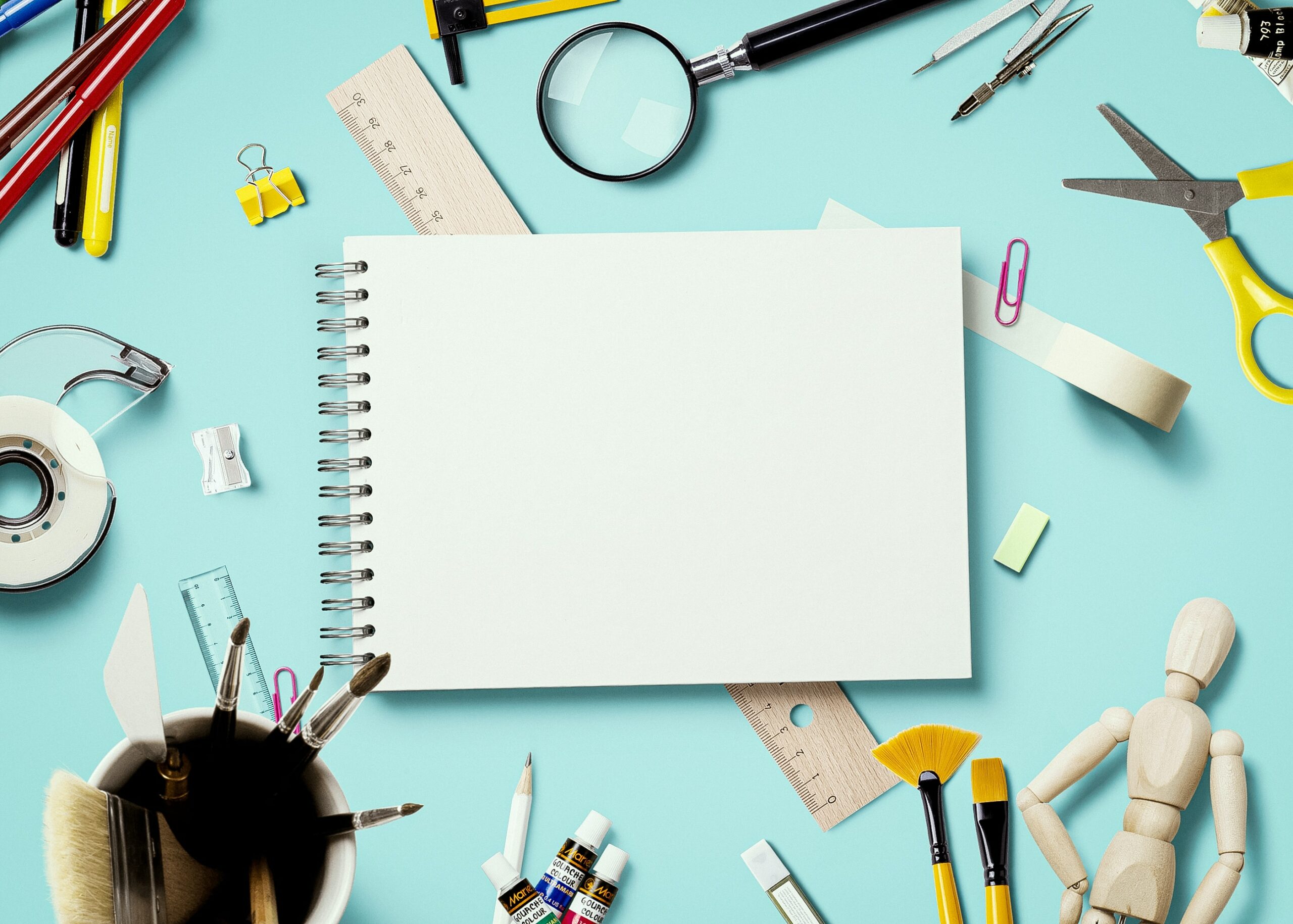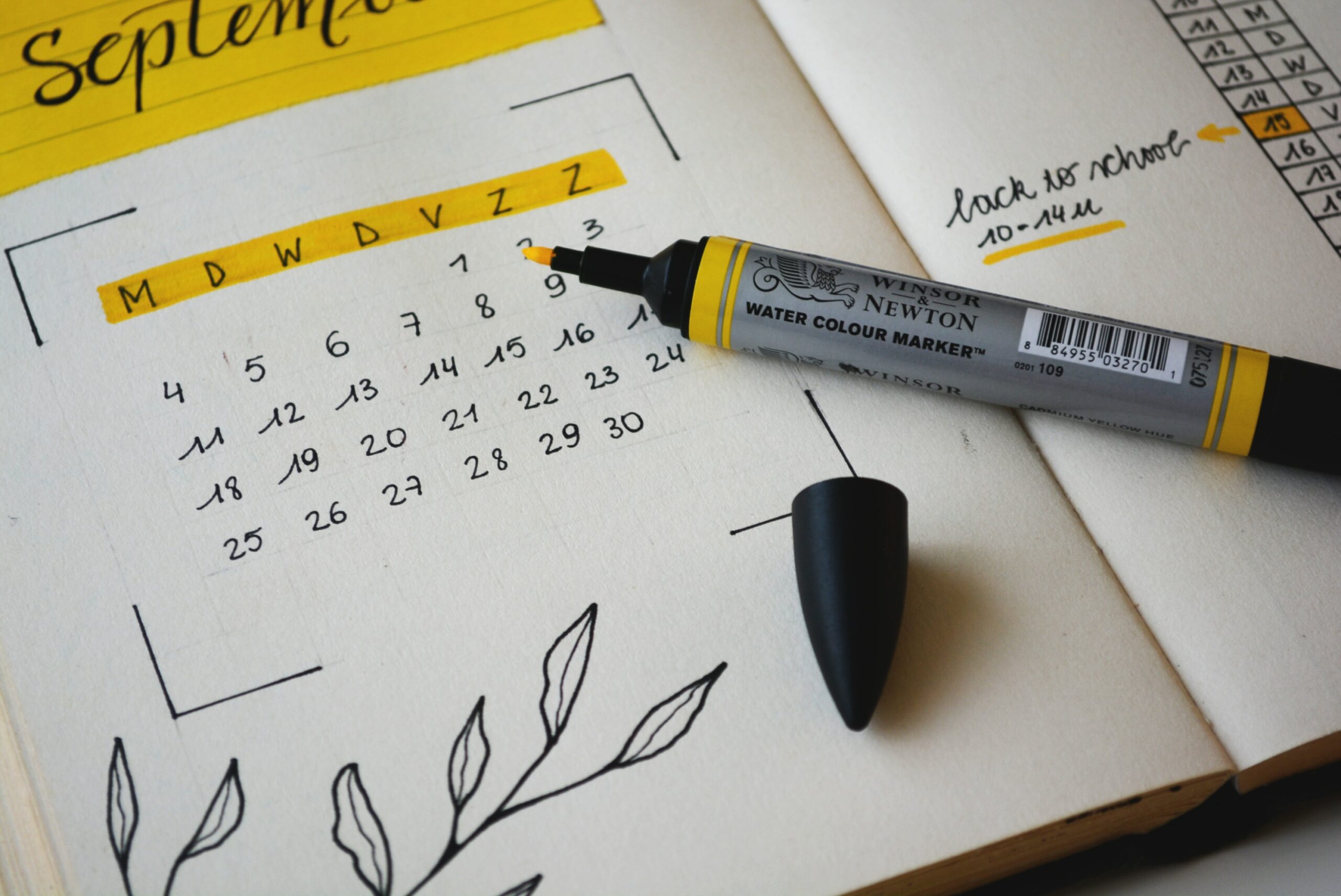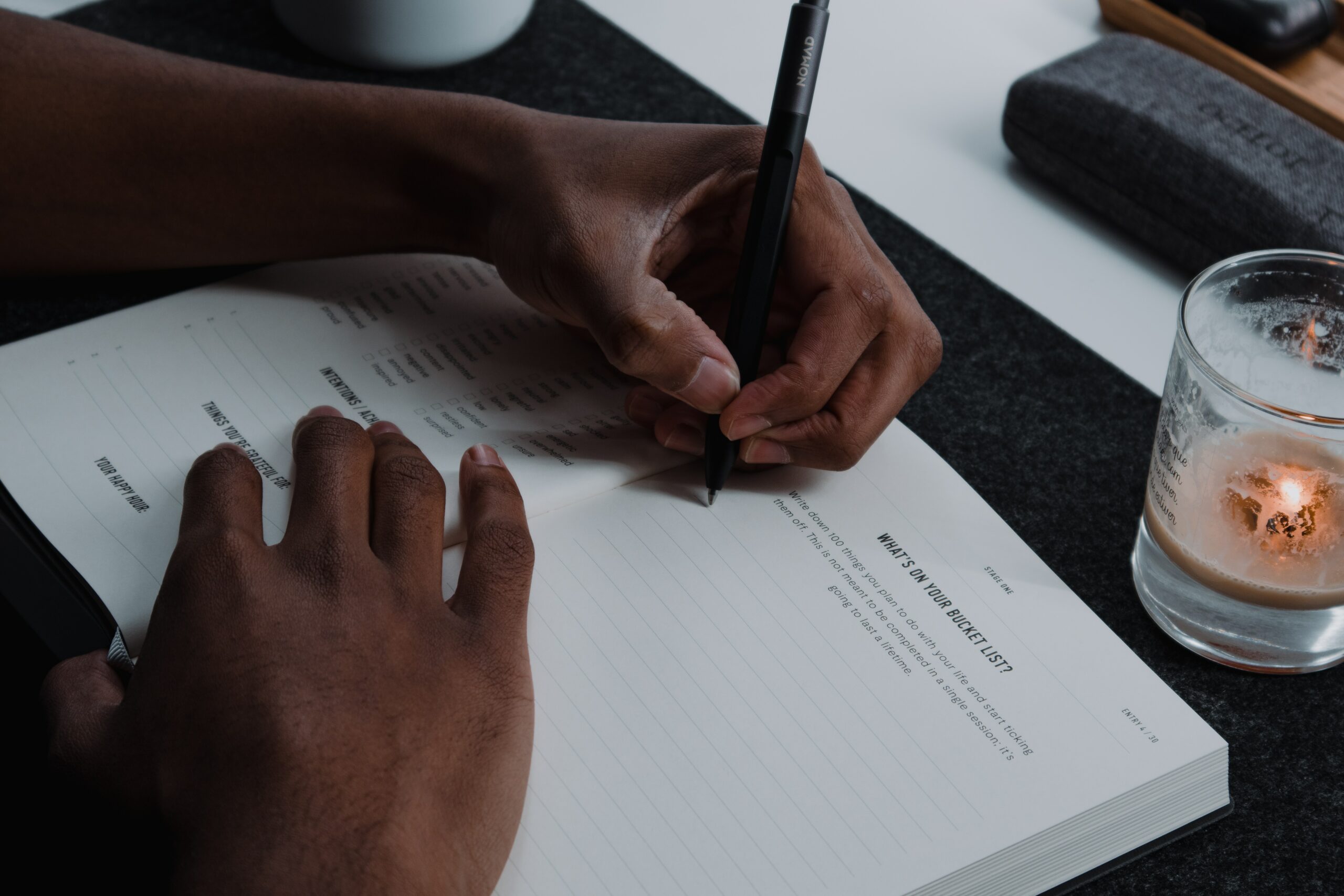Journaling, a practice as timeless as it is transformative, has recently seen a surge in popularity among those seeking personal growth and emotional well-being. It’s no longer just a diary-keeping exercise of our teenage years but has evolved into a powerful tool for self-reflection, mental clarity, and emotional processing.
Studies have shown that the simple act of regularly jotting down thoughts, feelings, and experiences can lead to significant improvements in mood, stress levels, and overall psychological well-being. From choosing your journaling tools to creating a journaling habit, in this article I will share 5 easy steps on how to start journaling.
As someone who has embraced the art of journaling for over a decade, I’ve witnessed firsthand its transformative power. This practise has not only been fulfilling but also eye-opening, as I’ve learned more about myself as an individual. Whether you’re looking to understand yourself better, manage stress, or simply find a creative outlet, these tips will provide a solid foundation to begin your journaling journey.
Table of Contents

Tip 1: Choosing Your Journaling Tools
As you embark on the rewarding practice of journaling, an important initial step is selecting the right tools. This foundational decision in learning how to start journaling is more than just a functional one; it sets the stage for your entire journaling experience.
The physical act of writing, especially in a dedicated journal with tools that resonate with you, enhances the journaling process. Research over the past 30 years has shown that journaling can significantly ease distress, reducing symptoms of depression, anxiety, and hostility, particularly in those who are very distressed.
The tools you choose can influence how often you journal and how emotionally connected you feel to the process.
Selecting a journal that you feel drawn to, whether for its aesthetic, tactile appeal, or the quality of its paper, can make the experience more inviting. Similarly, choosing a pen that glides smoothly or feels comfortable in your hand can make writing a more enjoyable and engaging activity.
In terms of psychological effects, journaling, particularly when done consistently with tools that you love, has been linked to fewer doctor visits and reduced symptoms of chronic diseases like asthma and arthritis.
This indicates that the act of writing itself, and the physical engagement with your journaling tools, can have significant health benefits.
Another study found that expressive writing, such as journaling about personal experiences and emotions, could improve immune system functioning.
Medical students who wrote about traumatic experiences showed higher antibody levels compared to those who wrote about everyday topics, suggesting that the content and emotional engagement of your journaling can have a measurable impact on your health (University of Auckland).
Suggested Article: 🖊️“5 Fun Journaling Ideas For Beginners”🖊️
Tips For Journaling Tools
When choosing your journaling tools, consider:
- Journal Type: Would you prefer a lined, unlined, or dotted journal? Does the size of the journal matter for portability? Do you want to use a paper tablet for better portability?
- Writing Instruments: Experiment with different pens, pencils, or even colored markers to find what feels best for you.
- Personalization: Adding personal touches like stickers, photos, or drawings can make the journal feel uniquely yours.
Remember, the right tools are the ones that inspire you to write. The journey on how to start journaling starts with the tools that feel right! They should feel like an extension of your thoughts and emotions, making the act of journaling a more intuitive and rewarding part of your day.
By investing time in selecting your tools, you’re not just preparing to write; you’re setting up a sanctuary for your thoughts, a space where you’re free to explore, reflect, and grow.

Tip 2: Creating a Regular Journaling Habit
When considering how to start journaling, creating a regular habit is fundamental. The benefits of journaling are maximized through consistent practice, which aids significantly in emotional processing and self-reflection.
Regular journaling has been linked to improvements in both physical and psychological health in various populations. Studies demonstrate that individuals who engage in expressive writing about emotional events have better health outcomes compared to those writing on neutral topics.
However, it’s common for beginners to grapple with how to start journaling regularly. Integrating journaling into your daily routine can seem daunting, but with the right strategies, it becomes an enriching part of your day.
Making Journaling a Habit
Below you can find a few essential tips that can help you to make journaling a habit:
- Start by setting aside a specific time for journaling, such as in the morning to set the tone for the day or in the evening as a reflective practice.
- Keep your journal in a visible and accessible place to remind you of your commitment.
- Pair journaling (a new habit you want to have) with another habit you already have (like meditating, reading before bed-time, drinking coffee in the afternoon). This is called habit-stacking & can help you form new habits, by adding them to existing ones.
In your journey of how to start journaling, remember that consistency is key. Even a few minutes a day can lead to profound long-term benefits.
Your journaling habit is a personal endeavor; what matters most is finding a rhythm that works for you and sticking to it. Over time, this practice can become a powerful tool for personal insight, emotional healing, and overall well-being.
Want to dive deeper into journaling and your inner world & commit to a 30-day journaling challenge? Check out my online video class “Journaling for Self-Reflection: A Simple 3 Question Practice”.

Tip 3: Finding Your Journaling Style
A crucial aspect of how to start journaling is discovering a journaling style that resonates with your personal preferences and goals. Each style offers unique benefits and caters to different needs, making your journaling journey more enjoyable and effective.
In my decade of journaling, experimenting with different styles has been incredibly enriching. Initially, my approach was more structured and I stayed with the classic notebook journaling approach, which helped me stay organized and focused.
Over time, I ventured into stream-of-consciousness writing, which allowed me to explore my thoughts and emotions more deeply. Additionally, I started documenting my experiences and thoughts not only in written journals, but also video and audio journals.
If you’re interested in less traditional methods, I’ve got a fantastic online class on how to start journaling and documenting your thoughts & emotions via written, audio, and video diaries.
Different Journaling Styles
Below are a few different approaches to journaling that you can try for yourself, seeing what resonates with you most:
- Bullet Journaling: Ideal for those who love organization and tracking goals. It involves creating lists, trackers, and brief entries, perfect for people with a busy lifestyle or who enjoy a structured approach.
- Stream of Consciousness: This style is more free-flowing and spontaneous, suitable for deep introspection and unloading thoughts without editing or filtering. It’s particularly beneficial for emotional processing and creative expression.
- Gratitude Journaling: Focusing on things you’re thankful for each day, this style cultivates positivity and mindfulness. It’s excellent for those looking to enhance their overall well-being and outlook on life.
- Art Journaling: Combining visuals and words, art journaling is great for those who think visually or wish to explore their creativity alongside their written words.
When considering how to start journaling, it’s important to remember that there’s no one-size-fits-all approach. Your journaling style might change over time, and that’s perfectly fine. The key is to allow your journaling practice to evolve with you, reflecting your current state and aspirations.
Start by trying out different styles and noticing how each makes you feel. Do you enjoy the structure and clarity of bullet journaling, or do you prefer the freedom and introspection of stream-of-consciousness writing?
Maybe a blend of different styles works best for you. The goal is to find a style that not only suits your personality but also supports your journey of self-discovery and personal growth.
In learning how to start journaling, finding your unique style is a journey in itself, one that is deeply personal and rewarding. Embrace the exploration, and let your journal become a reflection of who you are and all that you aspire to be.

Tip 4: Journaling Prompts to Kickstart Your Practice
It’s time to explore a valuable tool in journaling, especially for beginners: journaling prompts. These simple yet effective prompts can play a significant role in enriching your journaling experience, especially if you’re struggling with writer’s block or looking to deepen your reflections.
One of the most common challenges people face when starting their journaling journey is not knowing where to begin. Journaling prompts provide a clear starting point, helping you bypass the blank page syndrome.
With a prompt in hand, you’ll have a topic to explore, making it easier to put your thoughts into words.
Journaling prompts can steer your thoughts in directions you might not have ventured on your own. They encourage you to explore different aspects of your life, emotions, and experiences, leading to more profound self-discovery and personal growth.
Examples of Journaling Prompts
Here are some journaling prompts to get you started. Feel free to use these as a springboard for your own thoughts and experiences:
- What are three things you’re grateful for today, and why?
- Describe a challenge you’re currently facing. What steps can you take to overcome it?
- Write a letter to your future self, reflecting on your hopes and goals.
- Recall a childhood memory that brings you joy. What made that moment special?
- List five qualities you admire in others. How can you cultivate these qualities in yourself?
- Share an accomplishment you’re proud of and the journey that led you there.
- Explore your dreams and aspirations. Where do you see yourself in five years?
- Write about a book, movie, or experience that recently moved you emotionally. What lessons did you take from it?
- Reflect on a recent mistake or setback. What did you learn, and how can you grow from it?
- Imagine a day without any limitations. Describe what you would do and how it would make you feel.
Remember, there are no right or wrong answers in journaling. These prompts are here to guide you, but your journal is a private space where you can express yourself freely.
Incorporating journaling prompts into your practice can help you tap into your thoughts and emotions more deeply. So, the next time you wonder how to start journaling or face a blank page, turn to these prompts as your trusty companions to ignite your creativity and self-reflection.

Tip 5: Embracing Imperfection in Your Journaling Journey
In your quest to learn how to start journaling and establish a meaningful practice, one of the most important lessons you can embrace is the value of imperfection.
Journaling is not about producing flawless prose or adhering to rigid standards; it’s about self-expression, self-discovery, and personal growth. Here, we’ll delve into why embracing imperfection in your journaling journey is not only beneficial but essential.
Perfectionism can be a major roadblock on your journaling journey. The fear of making mistakes, the pressure to write flawlessly, and the urge to self-edit every sentence can stifle your creativity and authenticity. Instead of enjoying the process, you might find yourself stuck, unable to put pen to paper or type a single word.
Benefits of Accepting Imperfections
When you let go of the need for perfection, you open the door to more authentic and beneficial journaling:
- Authentic Expression: Your journal is your safe space to express your thoughts, feelings, and experiences without judgment. Embracing imperfection allows you to be honest and genuine in your writing, leading to a deeper connection with yourself.
- Overcoming Fear: By accepting that not every entry will be a literary masterpiece, you’ll alleviate the fear of making mistakes. This freedom enables you to explore your thoughts and emotions more freely.
- Personal Growth: Journaling is a tool for self-reflection and growth. When you stop striving for perfection, you can focus on the content and insights you gain from your journal, which is where the real value lies.
Tips for Embracing Imperfection:
To help you on your journey, consider the following tips:
- Silence Your Inner Critic: Remind yourself that your journal is for your eyes only. There’s no need to impress anyone or meet any standards.
- Set Realistic Expectations: Understand that not every entry will be profound, and that’s okay. Some days, you may simply record mundane details, and that’s part of the process.
- Embrace Mistakes: If you make a typo or your handwriting is messy, don’t let it bother you. These imperfections are part of your unique journaling style.
Personal Reflection
13 years ago I myself was intimidated and wondered about how to start journaling, if it will be difficult, and if the benefits will outweigh the efforts.
At first I was so concerned with writing neatly, having a structured approach, and always having something meaningful to journal about. However, I quickly learned that the reason journaling is so beneficial is because it is fully up to you + it. needs to be freeing!
Write in full sentences or bullet points, be neat or messy, doodle, write in the morning or at night, write a paragraph or 5 pages. Make it yours. Be messy, embrace imperfection.
Now You Know How To Start Journaling!
If you came here with a question on “how to start journaling” and “where can I start”, I hope that your questions have been answered!
As mentioned, I’ve been journaling for over a decade and all of these tips have helped me immensely in my journaling journey + making journaling a habit. I’m excited for you to start journaling so you can develop a deeper relationship with yourself, your thoughts, and your emotions!
